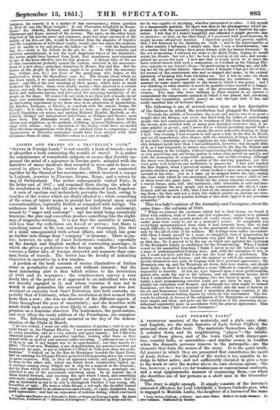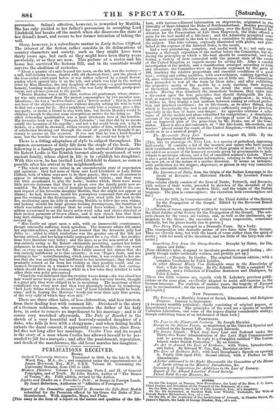LADY DORMETL'S
A vrtononou mastery of the materials, and a style easy, clear, and English, are the main features of Lady Selina Cliforcl, the principal story of this book. The materials themselves are slight. A country town and its neighbouring "places "—the inhabi- tants of those -places, and of the town itself, with dinner-par. ties, country balls, or assemblies—and similar scenes in London when the dramatis personm remove to -the metropolis—are the elements that form the scenes of the story. It is the quiet truth- ful manner in which they are presented that constitutes the merit of Lady Selina: for the mind of -the writer is too amiable to in- dulge in bitter satire, and not sufficiently elevated to give a tone to the work or raise the matter above its own obvious nature. She has, however, a quick eye for weaknesses or conventional contrasts, and a neat epigrammatic manner of expressing 'them,—as when she describes one of hor.persons as a short man in the Grenadier Guards.
The story is slight eeerigle It simply consists of the heroine's concealed affection for Lord Litchfield, a Roman Catholic peer, who is engaged to 3fatilda Ladle, thodaughter of abaronet of the same • Lady Selina Clifford.; 4, Novel: autlotheraales. 1Bdited.bvLada■Resaser. In 4incrgeoittenes. Italllishedby Bentley.
persuasion. Selina's affection, however, is rewarded by Matilda. She has only yielded to her father's persuasion in accepting Lord Litchfield, but breaks off the match when she discovers-the state of her friend's heart, and recurs to her former intention of taking the veil.
Story, however, is a subordinate matter in Lady Selina Clifford. • i . • The interest of the fiction rather consists n its delineations of
country characters and society, such as they might have been thirty years ago, but such as they might have been thirty years previously, or as they arc now. This picture of a rector and his house has survived the Reform Bill, and in its essentials would survive the abolition of rectories.
"About a quarter of a mile beyond the town, on the left, was the rectory— a tall, dull-looking house, shaded with old chestnut-trees; and the gloom of the iron-railed court-yard before it was rather relieved by a small flower- garden which opened into it on the left, and which was kept in the neatest order by Miss Hensley, the only daughter of the reotor —a good-humoured, homely, bustling woman of forty-five, who was Lady Bountiful, gossip-pur- veyor, and adviser-general to the parish. "Doctor Hensley was a little, fhin, restless old gentleman, whose charac- ter was only redeemed fton the merest commonplace by two peculiar qua- lifications,—he was a 'motive-finder,' and a horror-seeker ' ; that is, he could not hear of the slightest occurrence without directly setting his wits to work to find out a cause for it. Not a neighbour could take a journey, give a din- ner-party, or invite a friend to stay with him, but Doctor Hensley would be obliging enough to discover some surreptitious motive for his doing so. The other redeeming qualification was a most inveterate love of the horrible. His favourite book was the 'Ntavgate 'Calendar ' ; but that did by no means satisfy the keenness of his appetite ; and not a fire could break out, a leg be broken, or a child be drowned, within twenty miles of him, without a gleam of satisfaction breaking out through the cloud of gravity he thought it ne- cessary to assume on the occasion. It was not that he was a hard-hearted man, but the horrible was his natural element; he could not help it."
There is a fitting adaptation of style to subjeot throughout. The common occurrences of daily life form the staple of the book. The following is a family-party previous to the arrival of dinner-guests. Sir Robert Leslie is the Ron:ash baronet already mentioned, of very ancient family, whose object in life is to establish his daughters. With this view, he has invited Lord Litchfield to dinner, as soon as possible after his arrival in the neighbourhood.
"The whole party were rather in an uncomfortable state of expectation and agitation : they had none of them met Lord Litchfield or Lady Selina Clifford, both of whom were now to be their guests; they were all anxious to appear to advantage before such distinguished visitors ; and they were but little accustomed to play the hosts ; besides which, there were many little private distresses that threw a gib= over the family party now as- sembled. Sir Robert was out of humour because he had yielded to the ear- nest request of his favourite daughter Matilda, that she might not appear at dinner; he had, however, issued his peremptory command that she should pass the evening in the drimingroom. He now stood with his back to the fire, meditating upon his folly in suffering Matilda to follow her own whims, and looking around his large gloomy-looking drawingroom, the furniture of which was rather more antique than he. could have wished : he had been seldom accustomed. to see the heavy satin-wood sofas and chairs disrobed of their modest garments of brown chintz, and it now struck him that their long dark shining legs looked rather indecent, and had better have remained covered up. "Miss Leslie sat apart upon a sofa, with an immoveable countenance, though internally suffering much agitation. The domestic affairs fell under her superintendence, and she had just learned that the favourite jelly had fallen in ; added to which misfortune was the greater one of the fish not having arrived, and her being totally unprepared for a top dish : her medita- tions were therefore very bitter; and the more so as the non-arrival of fish was entirely owing to Sir Robert obstinately persisting, against her better judgment, in having his dinner-party take place on Monday—the very worst day, as every one knows, for fish. Miss Leslie assured her sisters that she was entirely indifferent as to this calamity ; it was 'Papa's fault, and was nothing to her ' : notwithstanding which assertion, it was evident to her sis- ters that she was anything but indifferent to her misfortunes ; they therefore prudently retired as far from her vicinity, as they possibly could, and en- sconced themselves in a window to watch the arrival of the first carriage which should drive up the avenue, while in a low voice they detailed to each other their own petty grievances.i
" Charlotte was distressed that the evening was so damp—she was afraid her hair would never keep in curl ; and Catherine, who was very brown, thought it a great pity they were obliged to be in mourning. The monotony of their complaints was every now and then very pleasingly broken by wondering how Lady Selina would be dressed,' and 'if Lord Litchfield would be hand- some,' and in hoping the Harveys would not wear their ugly blue gowns, of the very sight of which they were sick.' "
There are three other tales, of less elaboration, and less interest, from their dealing less with common life. Steinhault is the story of a German nobleman, who assassinates the father of his lady love, in order to remove an impediment to his marriage ; and is of course very wretched afterwards. • The Fate of Rosabel is the sketch of a very beautiful and heavenly-minded daughter of a duke, who falls in love with a clergyman; and when failing health extorts the ducal consent, it apparently comes too late, since Rosa- bel dies not long after her marriage. Cecilia Vere and its sequel is the story of a man whom Cecilia has allowed herself to be per- suaded to ,jilt for a marquis; and after the punishment, repentance, and. death of the marchioness, the old lover marries her daughter.



























 Previous page
Previous page